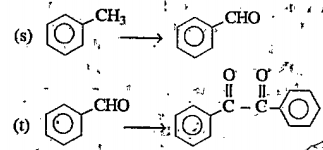Complete Solutions to EXERCISE of chapter SET-18 of Class 12 book with complete answers and questions
| Class 12 | CHEMISTRY |
| Chapter | SET-18 |
| UNITED BOOK HOUSE | EXERCISE |
| Number Of Questions | 66 |
| Academic Year | 2023-24 |
State Henry's law regarding solubility of a gas in liquid. On which factors Henry's constant `(K_H)` depends?
View SolutionWhat is an ideal solution? Give example
View SolutionBetween `KCN` and `K_2SO_4` which one is more effective and why for coagulation of `Fe(OH)_3` sol?
View SolutionDefine with proper example physical absorption.
View SolutionWhy Starch-Iodide paper gets blue when come in contact with starch?
View SolutionExplain why `NCI_3` gets hydrolysed but not `NF_3`.
View Solution`[CoF_6]^(3-` is paramagnetic but `[Co(NH_3)_6]^(3+` is diamagnetic explain.
View SolutionWhat are the monomers of Nylon 6 6 ? State one use of it.
View SolutionWhat is the co-ordination number of each particle in three dimen-sional cubic close pack?
View SolutionLead forms face centred cubic lattic having density 11.35 gm `cm^(-3`. What is the radius of Pb atom `at wt of Pb=207 gm `mole^(-1]`
View SolutionWhat is schortky defect?
View SolutionSilver forms face centred cubic lattice having edge length 4.086 `Å`. Find the density of Silver. (Given At wt of Ag=108).
View SolutionWhy Raoults law for relative lowering of vapour pressure is not applicable for concentrate solution?
View SolutionThe elevation of boiling poin is 0.70K when 12.5gm of a non electrolyte gets dissolved in 175 gm of water. Cacluate mole mass of the substance `K_b` =52K Kg `mol^(-1)`
View SolutionState Kohlrauseh laws. Calculate the moler conductance of `CH_3COOH` at infinite dilution 1 moler conductacne at infinite dilution for HCI, NaCI & `CH_3COONa` are 426, 126 and 91 `ohm^(-1) an^2 mol^(-1` respectively.
View SolutionWhat is the unit of electrochemical equivalence?
View SolutionExpress standard Hydrogen electrode.
View SolutionCalculate the E.M.F. for the cell given below `Mg(S)|Mg^(2+)(0.001)(M)||Cu^(2+)(0.01M)|Cu(S)` given `E_(Mg^(2+)//Mg)^@` =-2.36V. `E_(Cu^(2+)//Mg)^@`=+0.34V
View SolutionState the reaction that occurs in every stage of iron extraction in blast fernace.
View SolutionState one basic flux state its formula.
View SolutionWhat will happen when KI is added to acidified `KMnO_4` solution.
View SolutionWhich trivalent ion shows colour between Pm Lu and why?
View SolutionState the product when Bromoethane is treated with ethanolic KOH. Stae mechanis for that reaction.
View SolutionIdentity A-B.

View SolutionIdentity C-D.

View Solutionhttps://d10lpgp6xz60nq.cloudfront.net/physics_images/PAT_CHE_0XI_B05_C11_E01_132_Q01.png
View SolutionWhy Grignard reagent gets dissolved in ether?
View SolutionHow would you distinguish `1^@`, `2^@`, & `3^@` alcohol using Lucas reagent?
View SolutionState the product forms in the following reaction?

View SolutionState the product forms in the following reaction?

View SolutionState the product forms in the following reaction?

View SolutionState the product forms in the following reaction? `(CH_3)_2NHoverset(H_2SO_4)rarr?`
View SolutionState the product forms in the following reaction?

View SolutionAn organic compound containing C, H, N & O (A) on treatment with NaOH & `Br_2` from (B) B on treatment with `NaNO_2` and Hydrochloric acid forms `C` a primary alcohol wihc on iodoform test gives yellow-ish crystalline precipitate identify A, B & C. Give reasons and chemi-cal reaction.
View SolutionWrite the reactions between D(+) Glucose and (a) Tollen's reagent (b) `NaBH_4`.
View SolutionGive an example of a protein that taken past in trasportation.
View SolutionEstablish the rate equation for 1st order reaction.
View SolutionSpecific reaction rates for a reaction at 300K and 310K are `3xx10^(-6) S^(-1)` and `2.8xx10^(-5 S^(-1`. Calculate the activation enrgy for that reaction.
View SolutionState Arrhenecous equation relating rate of a reaction with tempera-ture dependence.How would you get activation energy from the plotiing of this equation.
View SolutionFor a zero order reaction the initial concentration of the reactant is 1.386 mol `L^(-1)`. If the half life period of the same be 20S then what. Shall be the concentration of the reaction after 30S.
View SolutionWhat will happen when `CI_2` is passed through hot concentrate caustic soda solution.
View SolutionExplain why `SO_2` shows both oxidising and reducing nature.
View SolutionWhy Xe forms most of the compound among the other inert gas?
View SolutionGive exmple of each: Etard reaction.
View SolutionGive exmple of each: Rosenmund reaction
View SolutionGive example of each: Schimdt reaction.
View SolutionIdentify A, B, C & D:
`CH_3-CH(OH)-CH_3overset(K_2Cr_2O_7//[O])underset(Conc. H_2SO_4)to` A`overset(CH_3MgI//H_2O)rarr`B
View SolutionIdentify A, B, C & D: `CH_3-overset(O)overset(||)(C)-CH_3overset(C_6H_5CO_3H)rarr` C+D
View SolutionHow would you carry out the following conversion. `CH_3COOHrarrCH_3CHO`

View SolutionQuantity of charge in Coulomb required to convert 1 mole `Cr_2O_7^(2-)` & `Cr^(3+)`.
View SolutionWhich one among the following gives black precipitate when reacts with ammonia.
View SolutionWhich one shows both optical and geometrical isomerism:
View SolutionWhich one will form effertvescence when added to 5 % `NaHCO_3` soln.
View SolutionWhich one is most basic
View SolutionWhich one is a natural fibre.
View SolutionAn anti histamin among the compounds.
View SolutionSodium form bce lattice with edge length 4.29 `overset^@A` therefore atomic radius of Na atom is .
View SolutionWhich is not a lyophilic sol
View SolutionLeast reactive towards SN1 reaction ?
View SolutionAcetone when kept with conc HCI:
View SolutionThe base which is abscent in DNA
View SolutionWhich one has higest sweetening action.
View SolutionState two advantages of using detergents as compare to soap.
View SolutionCalculate Manetic moment in BM of `V^(2+)` ion.
View SolutionWhy `Se^(3+)` form colourless compound?
View SolutionWhich one has higher energy of activation value between physisorption and chemisorption?
View Solution
EXERCISE questions and complete solutions for chapter SET-18 of UNITED BOOK HOUSE of Class 12